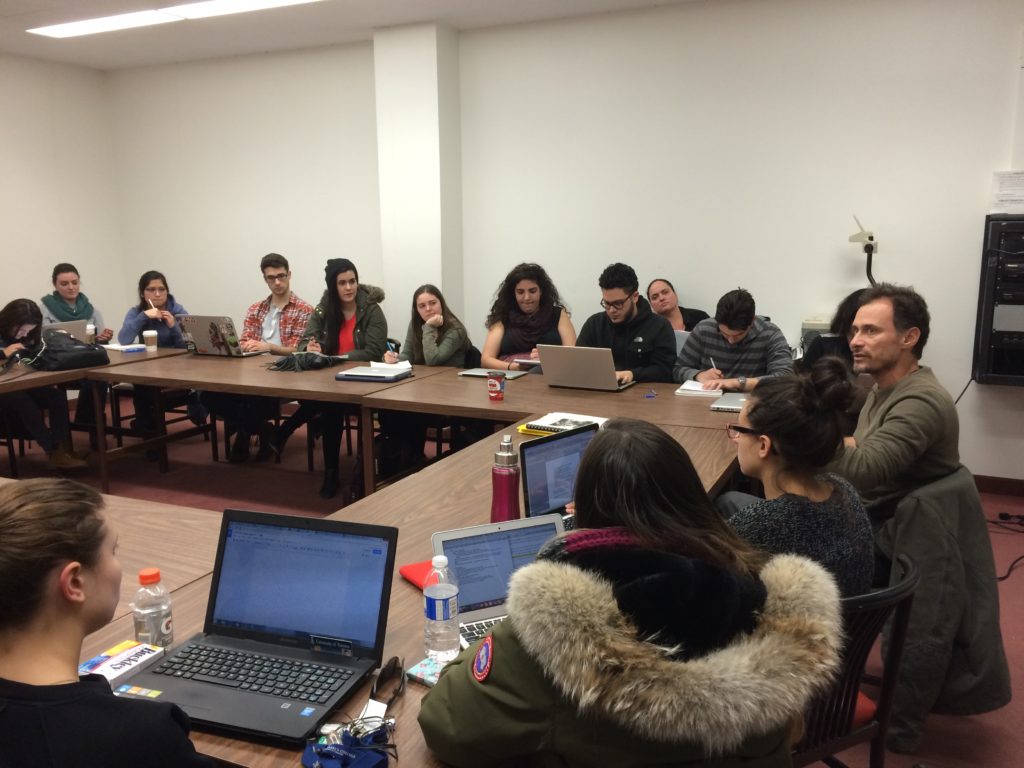by Veronica Salazar
Yesterday, Brazilian actor Enrique Diaz visited UofT. He shared with students enrolled in the course Brazilian Puzzle: Culture & Identity his experience working at the same time in television (Felizes para Sempre?) and theatre (Cine Monstro). His critically acclaimed adaptation into Portuguese of Canadian playwright Daniel McIvor’s trilogy will be presented this week in Toronto at Progress International Festival of Performance and Ideas.
Knowledge helps and directs human beings to develop while understanding the meaning of life. Knowledge is passed down from our ancestors to new generations through a different medium. One of the most common and easy ways is through stories; this is because storytelling is more accessible to people, stories can reach uneducated people as opposed to books. Theatre is another form of communication that derives from storytelling. It is very effective because when the events are being portrayed, the viewers can relate easier than a book. I believe theatre is a great media for the Brazilian people to get educated about their past and create a sense of national identity throughout Brazil, including the rural and humble areas.

Artists and filmmakers in Brazil want to create an effective connection between the public and their national identity, this is done so by reworking social problems like identity, politics, national roots and reenacting history; these scenarios are brought back to life through the use of film, novels, paintings, songs, plays, and even the popular telenovelas. Enrique Diaz is one of the artists that have helped the Brazilian people engage with their identity. We were fortunate to have him as a guest during our lecture. He explained that he loves his work so much that it is difficult for him to draw the lines between his life and his job. He didn’t go to university and created a theatre company with his friends in 1988. He was fascinated with theatre and wanted to be able to play around with the elements of theatre, and perhaps be able to reach more people while at the same time allowing them to participate in theatre. The focus of the company was to allow people to play with theatre without strict guidelines, and it worked very well since the company has a strong presence in the world of theatre. He said that the amounts of people you reach with theatre are many but it is a specific type of people.
Moreover, he explained how he likes to be open to different ideas, that is why he can do experimental theatre, television, and film. When he is working he likes to be related to desire, but he also has a strong ethic sense. He never talks about desire in a non-ethic way and he is concerned about the public, at the same time, he does not know who they are, so he does not feel like he is responsible for them, nonetheless, he tries to show the ethic sense in his work. He tries to take prejudice to show that desire is what moves the world. Additionally, he told us how he wants to go back to studying, he loves to read, that’s why he is going back to university to study literature. He explained that human beings get tired of patterns and literature is simple yet, stories are very important, and it can nourish him in terms of sensibility. Thus expanding his knowledge, as an actor and therefore he will be able to reach more people in Brazil. When I asked him what he believed was more influential in terms of reaching people he responded that theatre is more influential than television because it is where actors can show who they are the most.
I believe it is fascinating how acting and theatre can reach people who are illiterate and don’t have the means to become literate. It allows those who have nothing; still have access to knowledge and history, which I think is very important for the people of Brazil. Social issues are also expressed and explored through theatre, allowing the public who do not access to education, to still learn about them and get informed. As I said before, stories are passed down through generations enabling societies to strive and evolve. Theatre is a great resource to reach people in the most personal ways as well as it makes the information accessible to the masses, and makes stories easier to understand.